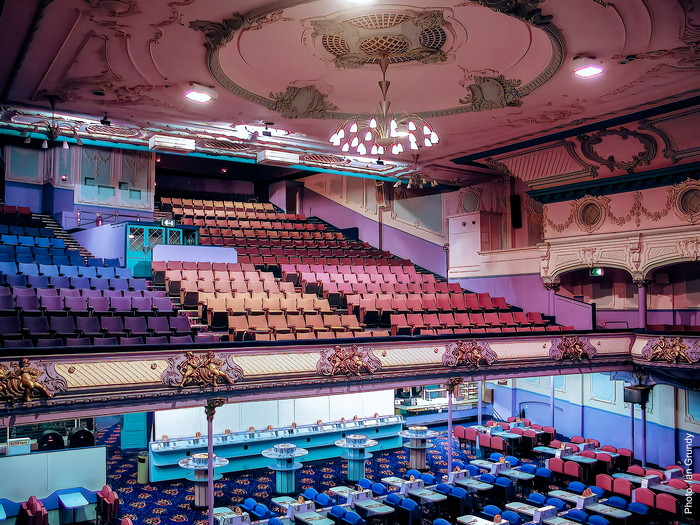
Theatres Trust, the charity that campaigns to protect the UK’s theatres, has published its annual Theatres at Risk Register. 10 theatres have been added to the 2022 Register, far more than in any recent years, as the impact of the Covid-19 pandemic is being felt across the theatre sector. The Theatres at Risk Register has expanded this year to highlight the plight of 41 theatres across the country that are in danger of being lost.
Now in its 16th year, the Theatres at Risk Register supports theatres under threat of closure, redevelopment or demolition across the UK, calling the public’s attention to these important buildings, their challenges, and the significant cultural opportunities they can bring to local communities. Every theatre on the register has strong architectural merit, cultural heritage or value to the local community as a performance venue. Crucially, all of them have the potential to be revived with the right support.
After nearly two years of the pandemic, the theatre industry, local authorities and private businesses are all feeling the strain, contributing to the unprecedented number of additions to the Register this year. The struggles faced by businesses and local authorities have a knock-on effect that impacts the theatre buildings they own. An emerging trend is for local authorities, in the face of increasing financial pressure, to look to dispose of the theatre buildings they own, with no guarantee that they’ll be kept in community use. The local authorities that own Clair Hall in Haywards Heath, Netherton Arts Centre in Dudley, and Thameside Theatre in Thurrock, all made the decision to sell or redevelop their buildings during the pandemic, leading Theatres Trust to add them to the Theatres at Risk Register.
Similarly, former theatre buildings that were in use as bingo halls, pubs or nightclubs are being sold by their private owners as demand for hospitality businesses was hit by lockdowns. Garrick Theatre in Southport is being added to this year’s Theatres at Risk list as it was sold by Mecca Bingo and is now at risk of being redeveloped for residential use. Imperial Theatre in Walsall is also threatened with redevelopment, having previously been a bingo hall and Wetherspoons pub.
Aside from the devastating impact of Covid, theatre buildings continue to face the threat of demolition and redevelopment, as is the case of new additions Amulet Theatre in Shepton Mallet, Borough Halls in London Borough of Greenwich, and the Roundhouse in Dover. This would see the loss of buildings where there is a clear local demand for performance venues. The final two additions to the Theatres at Risk Register, the Globe in Plymouth, and the Regent Theatre in Great Yarmouth, have been empty for several years and their building condition has now deteriorated to the point that they are in danger of being irreparably damaged.
David Morrissey, Theatres Trust Ambassador, actor and director, comments, Theatres play a vital role in communities across the country and in supporting actors like myself who without their local theatre would not have developed a theatre career. The pandemic has been devastating for the whole theatre sector, but we must work together to make sure the theatres on the Theatres at Risk list are supported and protected for future generations to enjoy.
Theatres Trust Director Jon Morgan says, “We are now starting to see the true extent of the effects of the pandemic on the UK’s wonderful theatre buildings, hitting well-loved community theatres as well as historic theatres that had been protected by other uses like being bingo halls. Theatres Trust would urge anyone who owns a theatre building to consider its long-term value as a performance space and work with us to keep these buildings in use for their communities.”
While the present outlook may look bleak, every building on the list still has the potential to return to use. Since the Theatres at Risk Register began in 2006, 80 of the 187 theatres that have appeared on the list have been reopened as live performance venues, are under refurbishment or have a suitable replacement planned. Examples of theatres saved include Alexandra Palace Theatre, Bradford Odeon, Peterborough New Theatre and Stockton Globe.
The theatres appearing on the 2022 register are as follows:
Brighton Hippodrome
Theatre Royal Margate
Victoria Pavilion/Winter Gardens, Morecambe
Dudley Hippodrome
Hulme Hippodrome, Manchester
Plymouth Palace
Victoria Theatre, Salford
Groundlings Theatre, Portsmouth
Spilsby Theatre, Lincolnshire
Streatham Hill Theatre, London
Theatr Ardudwy, Harlech
Winter Gardens Pavilion, Blackpool
Burnley Empire
Garston Empire, Liverpool
Intimate Theatre, Palmers Green, London
Mechanics Institute, Swindon
Tottenham Palace Theatre
Century Theatre, Coalville, Leicestershire
Granada, Walthamstow, London
Leith Theatre
Joe Longthorn Pavilion, Blackpool
Roundhouse Theatre, Dover – NEW
Co-op Music Hall, Ramsbottom
Doncaster Grand
Kings Theatre Continental Restaurant and Ballroom, Dundee
Amulet Theatre, Shepton Mallet – NEW
Conwy Civic Hall (Cube), Wales
Derby Hippodrome
Imperial Theatre, Walsall – NEW
Borough Hall, London Borough of Greenwich – NEW
Kings Theatre, Kirkcaldy
Thameside Theatre, Thurrock – NEW
Garrick Theatre, Southport – NEW
Tameside Hippodrome, Ashton-under-Lyne
Globe Theatre, Plymouth – NEW
Clair Hall, Haywards Heath – NEW
Netherton Arts Centre, Dudley – NEW
Regent Theatre, Great Yarmouth – NEW
Swansea Palace
Theatre Royal, Hyde, Cheshire
Theatre Royal, Manchester
Assessment criteria for each theatre is available via www.theatrestrust.org.uk/how-we-help/theatres-at-risk/theatres-at-risk-assessment-criteria and full case studies on each can be seen on the Theatres Trust website.
Further information from the Theatres Trust: www.theatrestrust.org.uk/how-we-help/theatres-at-risk

About Theatres Trust
Theatres Trust is the national advisory public body for theatres. They believe that current and future generations should have access to good quality theatre buildings where they can be inspired by, and enjoy, live performance. They champion the future of live performance by protecting and supporting excellent theatre buildings which meet the needs of their communities. They do this by providing advice on the design, planning, development, and sustainability of theatres, campaigning on behalf of theatres old and new and offering financial assistance through grants.


